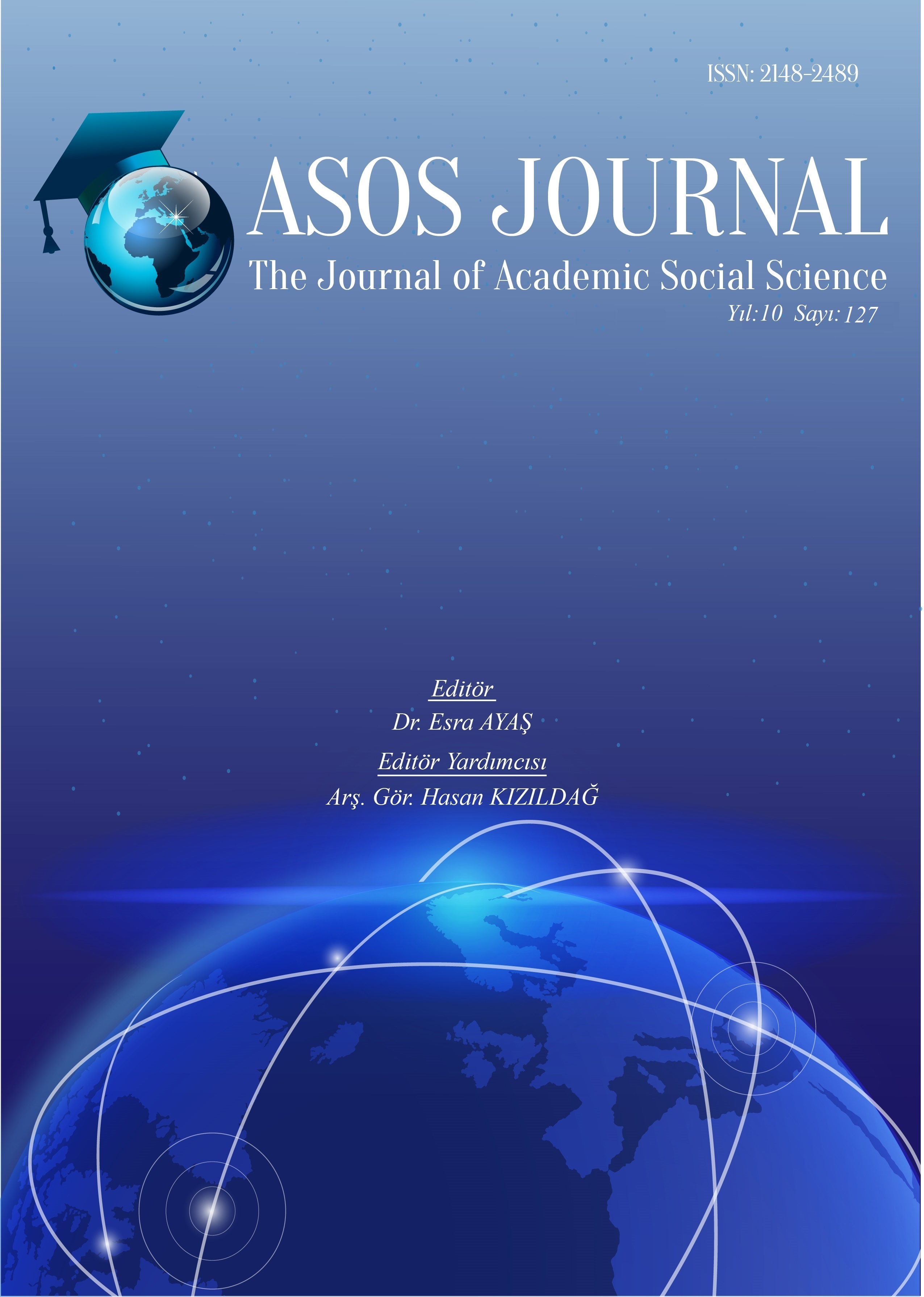Author :
Abstract
Bu çalışma 2019-2020 Eğitim Öğretim yılının ikinci yarıyılında gerçekleştirilmiştir. Çalışmada 4. Sınıf fen bilimleri öğretim programında yer alan “Kuvvetin Etkileri” ünitesinin bir konusu olan “Kuvvetin Cisimler Üzerindeki Etkileri” konusunun öğretimi için bir eğitsel oyun tasarlanmıştır. Tasarlanan “Kuvvetin Etkisi” oyunu hakkında öğretmenlerin görüşlerinin belirlenmesi amaçlanmıştır. Bu araştırmada nitel araştırma yöntemlerinden fenomenoloji (olgu bilim) deseninden yararlanılmıştır. Araştırmanın çalışma grubunu devlet okullarında görevde olan 10 sınıf öğretmeninden oluşmaktadır. Çalışmada amaçlı örnekleme yöntemlerinden olan tipik durum örneklemesi yöntemi kullanılmıştır. Araştırmacılara tasarlanan oyun ile ilgili doküman e-posta yoluyla ve WhatsApp uygulaması aracılığı ile iletilmiştir. Çalışmada yarı yapılandırılmış mülakat tekniği ile veriler toplanmıştır. Veriler, içerik analizi yardımıyla çözümlenmiştir. Çalışmada eğitsel oyunların eğlenerek kalıcı öğrenme sağladığı, bilişsel, duyuşsal ve psikomor yönden geliştirdiği ve öğretimi kolaylaştırdığı yönünde bulgular saptanmıştır. Tasarlanan oyunun kazanımları karşıladığı ve öğretmenler açısından uygulanabilir bir oyun olduğu sonucuna varılmıştır. Çalışma sonunda, MEB bünyesinde, bütün öğretmenlerin ulaşabileceği eğitsel oyun havuzunun yapılması gerektiği yönünde öneride bulunulmuştur.
Keywords
Abstract
This research was carried out in the second semester of the 2019-2020 academic year. In the research, an educational game was designed to teach “The Effects of Force on Objects” which is a subject of the “Effects of Force” unit in 4th grade science curriculum. It was aimed to determine the opinions of teachers about the designed “Effect of Force” game. In this research, phenomenology (phenomenology) pattern was used, which is one of the qualitative research methods. The study group of the research consists of 10 classroom teachers working in public schools. The typical case sampling method, one of the most known purposeful sampling methods was used in the research. The document about the game designed for the researchers was sent via e-mail and WhatsApp application. In the study, data were collected by semi-structured interview technique. The data were analyzed with the help of content analysis. In the study, findings have been found that educational games provide permanent learning by having fun, develop in cognitive, affective, and psychomotor aspects and facilitate teaching. It is concluded that the designed game meets the achievements and is an effective game for teachers. At the end of the study, it was suggested that an educational game pool that all teachers could reach should be built within the Ministry of National Education.
Keywords
- Baş, G. (2011). Türkiye’de eğitim programlarında yapılandırmacılık: Dün, bugün, yarın. Eğitişim Dergisi, 32, http://www.egitisim.gen.tr/tr/index.php/arsiv/sayi-31-40/sayi-32ekim-2011/739-turkiye-de-egitim-programlarinda-yapilandirmacilik-dun-bugun-yarin, Erişim tarihi: 18.07.2021
- Beker Baş, M. & Karamustafaoğlu, O. (2020). Merkezi ve çevresel sinir sistemi konusunda geliştirilmiş bir eğitsel oyun. Gazi Eğitim Bilimleri Dergisi, 6(1), 80-92.
- Büyükalan Filiz, S. (2014). Eğitimle İlgili Temel Kavramlar. M. Ç. Özdemir (Ed.). Pegem Akademi.
- Canbazoğlu Bilici, S. (2019). Örnekleme yöntemleri. H. Özmen ve O. Karamustafaoğlu (Ed.). Eğitimde Araştırma Yöntemleri İçinde, Pegem Akademi.
- Cop, M.R. & Kablan, Z. (2018). Türkiye’de eğitsel oyunlarla ilgili yapılmış çalışmaların analizi. Kocaeli Üniversitesi Eğitim Bilimleri Dergisi, 1(1), 52-71.
- Creswell, J. W. (2018). Nitel Araştırma Yöntemleri, (4. Baskı). Siyasal Kitapevi.
- Çiftcibaşı, F. & Karamustafaoğlu, O. (2019). Eğitsel bir oyunla fen öğretimi: Işığın kırılması ve mercekler. 2. International Learning Teaching and Educational Research Congress (ILTER 2019) bildiriler kitabı içinde (ss. 93-99). Amasya Üniversitesi.
- Gülbahar, Y. & Alper, A. (2009). Öğretim teknolojileri alanında yapılan araştırmalar konusunda bir içerik analizi. Ankara Üniversitesi Eğitim Bilimleri Fakültesi Dergisi, 42(2), 93-111.
- Gürbüz, F., Çeker, E. & Töman, U. (2017). Eğitsel şarkı ve oyun tekniklerinin öğrencilerin akademik başarıları ve kalıcılığı üzerine etkileri. Bayburt Eğitim Fakültesi Dergisi, 12(24), 593-612.
- Karamustafaoğlu, O. & Aksoy, S. (2020). Canlıların sınıflandırılması” konusunda geliştirilen eğitsel oyunla ilgili öğretmen görüşleri. Academia Eğitim Araştırma Dergisi, 5(1), 90109.
- Korkmaz, S. (2018). Eğitsel Oyun geliştirerek desteklenen fen bilimleri öğretiminin öğrenci tutum ve başarısına etkisi. Yayınlanmış yüksek lisans tezi, Bartın Üniversitesi Eğitim Bilimleri Enstitüsü.
- Kula, S. S. (2020). Zekâ oyunlarının ilkokul 2. sınıf öğrencilerine yansımaları: Bir eylem araştırması. Milli Eğitim, 49(225), 253-282.
- MEB -Milli Eğitim Bakanlığı- (2018). Fen bilimleri dersi öğretim programı (ilkokullar ve ortaokullar 3, 4, 5, 6, 7 ve 8. Sınıflar) öğretim programı. Ankara.
- MEGEP -Mesleki Eğitim ve Öğretim Sisteminin Güçlendirilmesi Projesi- (2014), Çocuk gelişimi ve eğitimi, oyun etkinliği-1, http://www.megep.meb.gov.tr/mte_program_modul/moduller_pdf/Oyun%20Etkinlikleri %20-1.pdf. Erişim tarihi: 18.01.2022
- Merriam, S. B. (2018). Nitel Araştırma Desen ve Uygulama İçin Bir Rehber, (4. Baskı). Nobel Akademik Yayıncılık.
- Özmen, H. (2004). Fen öğretiminde öğrenme teorileri ve teknoloji destekli yapılandırmacı (constructivist) öğrenme. The Turkish Online Journal of Educational Technology, 3(1), 100-111.
- Patton, M. Q. (2018). Nitel Araştırma ve Değerlendirme Yöntemleri, (2. Baskı). Pegem Akademi
- Türnüklü, A. (2000). Eğitim bilim araştırmalarında etkin olarak kullanılabilecek nitel araştırma tekniği: Görüşme. Kuram ve Uygulamada Eğitim Yönetimi, 24, 543-559.
- Yıldırım, A. & Şimşek, H. (2018). Sosyal Bilimlerde Nitel Araştırma Yöntemleri, (11. Baskı). Seçkin Yayıncılık.





